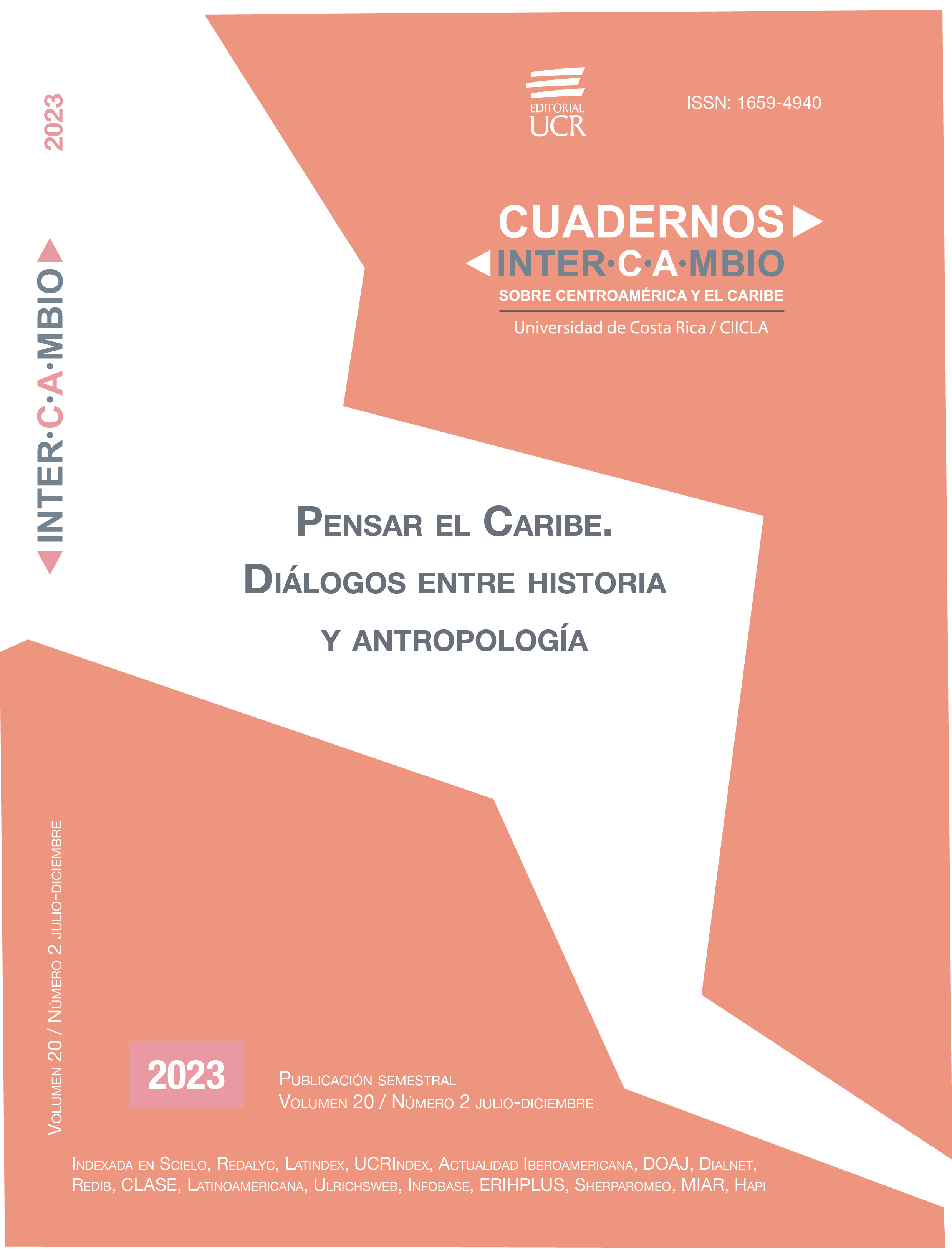Resumen
El presente artículo se propone analizar la construcción de las políticas de salud mental durante la transición de la esclavitud al régimen asalariado en Jamaica, desde finales del siglo XVIII hasta 1861, con la finalidad de elaborar una cronología que permita entrever sus particularidades en el contexto colonial. Así, se revela cómo la gestión de la “demencia” formó parte del proceso de elaboración de políticas y dispositivos específicos para el disciplinamiento y socialización de las mayorías negras en una sociedad racialmente diferenciada, en un contexto de gran conflictividad social. Para ello, analizamos fuentes primarias de la época –documentación estatal, textos y producciones de personalidades médicas y políticas pertinentes, artículos de prensa–, como también bibliografía especializada, para el contexto jamaiquino, regional y global, con el objetivo de profundizar en el estudio del papel de la medicina y la psiquiatría en la emergencia de discursos y políticas específicas para la construcción del ciudadano imperial.
Citas
A sign of progress. (17 de septiembre de 1894). Daily Gleaner, p. 4.
Altink, Henrice. (2001). Slavery by another name: Apprenticed women in Jamaican workhouses in the period 1834–8. Social History, 26(1), 40-59.
Altink, Henrice. (2012). Modernity, race and mental health care in Jamaica, c. 1918-1944. Journal of the Department of Behavioural Sciences, 2(1), 1-19.
Barringer, Tim y Modest, Wayne. (2018). Victorian Jamaica. Duke University Press.
Bigelow, John. (1851). Jamaica in 1850: or the Effects of Sixteen Years of Freedom on a Slave Colony. George P. Putnam.
Bilby, Kenneth y Handler, Jerome (2004). Obeah: Healing and Protection in West Indian Slave Life. The Journal of Caribbean History, 38(2), 153-183.
Bowerbank, Lewis. (1858). A circular letter to the individual members of the Legislative Council and of the House of Assembly of Jamaica, relative to the Public Hospital and Lunatic Asylum of Kingston. s.n.
Bowerbank, Lewis. (1859). A Circular Letter to the Individual Members of the Legislative Council and of the House of Assembly of Jamaica, Relative to the Public Hospital and Lunatic Asylum of Kingston. J. Gall & Co.
Bowerbank, Lewis. (1865). The letters of Mr. Alexander Fiddes, F.R.C.S., Edin. considered and refuted, his misrepresentations exposed, his calumnies and innuendoes set in the light of truth, his various statements in the press and otherwise weighed in the balance and found wanting / by Lewis Quier Bowerbank; together with documentary letters and papers, tending to expose a professional conspiracy, and to afford the public in the colonies, and in Great Britain, correct judgment as to the controversy now existing on hospital matters. George Henderson.
Craton, Michael y Greenland, Garry. (1978). Searching for the Invisible Man: Slaves and Plantation Life in Jamaica. Harvard University Press.
Cumper, George. (1956). Population Movements in Jamaica, 1830-1950. Social and Economic Studies, 5(3), 261-280.
Danby, John. (1950). The Jamaica rebellion of 1865: its causes, course and consequences. [Tesis de Maestría en Artes]. University of Southern California.
Graham, Aaron. (2019). Towns, government, legislation and the ‘police’ in Jamaica and the British Atlantic, 1770–1805. Urban History, 47(1), 1-22.
Griffith-Hughes, Elisabeth. (2003). A mighty experiment: the transition from slavery to freedom in Jamaica. 1834-1838. [Tesis de Doctorado en Filosofía]. University of Georgia.
Harris, Dawn; Newman, Richard; Rael, Patrick y Sinha, Manisha. (2017). Punishing the Black Body: Marking Social and Racial Structures in Barbados and Jamaica. University of Georgia Press.
Hickling, Frederick y Gibson, Roger. (2012). Decolonization of Psychiatric Public Policy in Jamaica. West Indian medical journal, 61(4), 437-441.
Higman, Barry. (2005). Plantation Jamaica. Capital and Control in a Colonial Economy. University of West Indies Press.
Hogarth, Rana. (2016). Charity and terror in eighteenth-century Jamaica: The Kingston Hospital and Asylum for Deserted ‘Negroes’. African and Black Diaspora: An International Journal, 3, 281-298.
Hogarth, Rana. (2017). Medicalizing Blackness: Making Racial Difference in the Atlantic World, 1780-1840. The University of North Carolina Press.
Jemmott, Jenny. (2013). Institutional Care of the Mentally Ill in Nineteenth-Century Jamaica. International Journal of Education and Research, 1(6), 12.
Knox, A. J. (1977). Opportunities and opposition: the rise of Jamaica's black peasantry and the nature of the planter resistance. Canadian Review of Sociology, 14(4), 381-395.
Moore, Brian y Johnson, Michele. (2004). Neither Led nor Driven: Contesting British Cultural Imperialism in Jamaica, 1865-1920. University of the West Indies Press.
Morgan, Kenneth. (2012). Labour Relations during and after Apprenticeship: Amity Hall, Jamaica, 1834-1840. Slavery & Abolition, 33(3), 457-478.
Patterson, Orlando. (1982). Persistence, Continuity, and Change in the Jamaican Working-Class Family. Journal of Family History, 7(2), 135-161.
Post, Ken. (1978). Arise ye starvelings. Martinus Nijhoff.
Pringle, John. (1838). Report of Captain J.W. Pringle, on prisons in the West Indies. Jamaica. James & Luke G. Hansard & Sons, Printers.
Smith, Leonard. (2014). Insanity, Race and Colonialism: Managing Mental Disorder in the Post-Emancipation British Caribbean, 1838-1914. Palgrave Macmillan.
Sturge, Joseph y Harvey, Thomas. (1838). The West Indies in 1837: being the journal of a visit to Antigua, Montserrat, Dominica, St. Lucia, Barbadoes, and Jamaica undertaken for the purpose of ascertaining the actual condition of the Negro population of these islands. Hamilton, Adams, and Co.
Swartz, Sally. (2010). The regulation of British colonial lunatic asylums and the origins of colonial psychiatry, 1860-1864. History of Psychology, 13(2),160-77.
The lunatic Asylum. (13 de junio de 1872). Daily Gleaner, p. 2.
Thome, James y Kimbal, Joseph Horace. (1838). Emancipation in the West Indies. A Six Months' Tour in Antigua, Barbados and Jamaica, in the Year 1837. The American Antislavery Society.
Trench, D. P. (1860). Official documents on the case of Ann Pratt, the reputed authoress of a certain pamphlet, entitled “Seven months in the Kingston Lunatic Asylum, and what I saw there”. Jordon & Osbourn.
Weeks, Deborah. (2008). Movement of the People: The Relationship between Black Consciousness Movements, Race, and Class in the Caribbean. [Tesis de Master of Liberal Arts Department of Africana Studies]. University of South Florida. https://digitalcommons.usf.edu/cgi/viewcontent.cgi?article=1559&context=etd

Esta obra está bajo una licencia internacional Creative Commons Reconocimiento-NoComercial-SinObraDerivada 3.0.

